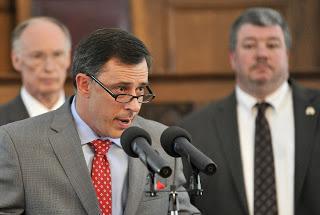
Spencer Collier, with Robert Bentley (background, left)
(From al.com)
Bentley fired Collier in March, and Collier responded with a lawsuit in April, claiming he was terminated because he knew about Bentley's extramarital affair with former advisor Rebekah Caldwell Mason, and Bentley had improperly ordered him to not give statements to prosecutors in the public corruption case against House Speaker Mike Hubbard. After being terminated, Collier stated publicly that he had seen evidence of the Bentley/Mason affair.
What is sovereign immunity? That's not an easy question to answer. A case styled Alabama State University v. Stacy Danley (Ala. Sup. Ct., 2016) provides a fairly concise answer. It boils down, mainly, to the source of damages if a plaintiff prevails; such damages generally cannot come from the state. Wrote the Danley court:
To determine whether an action against a State officer is, in fact, one against the State, this Court considers "whether 'a result favorable to the plaintiff would directly affect a contract or property right of the State . . . whether the defendant is simply a 'conduit' through which the plaintiff seeks recovery of damages from the State . . . and whether 'a judgment against the officer would directly affect the financial status of the State treasury,'
That last one, highlighted in yellow, seems to be the key consideration. But Collier appears to be seeking damages from Bentley, as an individual, and not (directly or indirectly) from the state.
Still, suing a governor is not easy, as made clear in Wheeler v. George, 39 So. 3d 1061 (Ala. Sup. Ct., 2009). In that case, the governor in question was Don Siegelman. The case involved procurement of property for a Hyundai plant:
The matters made the basis of the claims against then Governor Siegelman . . . in causing the State to fund the purchase of the Shelton property for Hyundai, stem from actions taken while he was executing the duties of his office. Alabama courts have "consistently held that a claim for monetary damages made against a constitutional officer in the officer's individual capacity is barred by State immunity whenever the acts that are the basis of the alleged liability were performed within the course and scope of the officer's employment."
The highlighted section, we believe is where Bentley runs into trouble. Based on news reports, here is a key component of Collier's complaint. (See complaint at the end of this post.)
The complaint – as Collier has alleged from the beginning – says he was punished by Bentley, at the direction of Mason, because he refused to lie to the attorney general's office about prosecutorial misconduct alleged by the defense in the case of Alabama House Speaker Mike Hubbard.
Is it "within the course and scope" of Bentley's employment to interfere with a state prosecution? It's hard to imagine that it would be. Collier also could make the argument that he was fired for knowing about the Bentley/Mason extramarital affair. That might lead to this question: Does the scope of Bentley's employment include fondling, groping, and talking nasty to female advisors? For some reason, we doubt it.
Here is another consideration: Alabama courts long have cited six exceptions to the protections of sovereign immunity. Here is how the Alabama Supreme Court, in Danley, phrased No. 6:
(6) actions for injunction or damages brought against State officials in their representative capacity and individually where it was alleged that they had acted fraudulently, in bad faith, beyond their authority, or in a mistaken interpretation of law.
Bentley's own attorneys, in their motion to dismiss on sovereign immunity grounds, state that "Collier attempts to plead his way around state-agent immunity by alleging that the Governor’s actions 'were willful, malicious, fraudulent, in bad faith and/or beyond [his]authority.'” That's not an attempt "to plead his way around state-agent immunity"; that is a proper statement of an exception to sovereign-immunity protection.
At the very least, Collier should overcome Bentley's motion to dismiss and be able to conduct discovery -- seeking answers to interrogatories, depositions, and production of documents -- in order to overcome the hurdle of summary judgment and prove his case.
If the court follows the actual law -- and that's always a big "if" in Alabama courts -- Bentley's efforts to hide behind the cloak of sovereign immunity should fail.
Spencer Collier lawsuit by Jeremy W. Gray on Scribd
